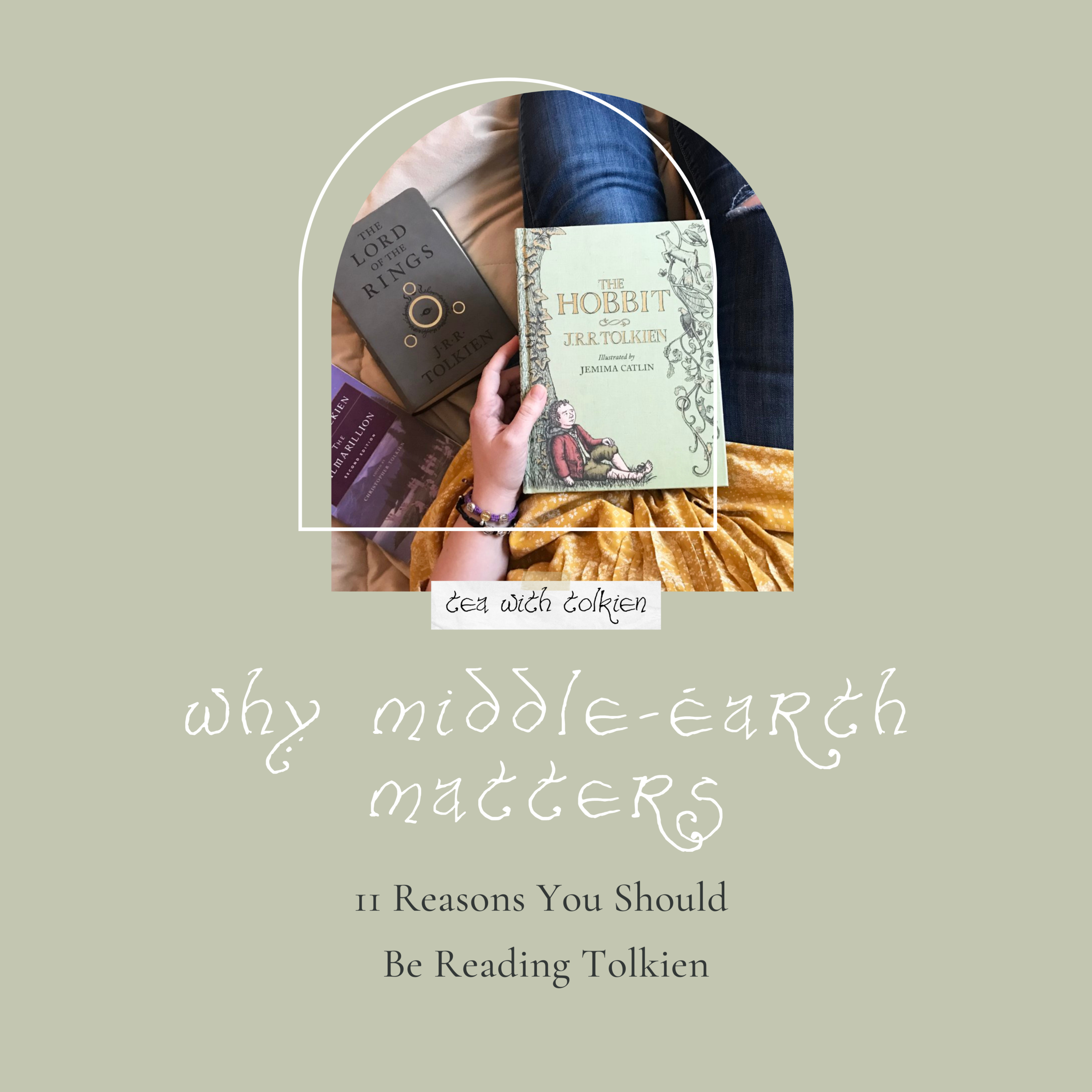Why Middle-earth Matters: 11 Reasons You Should Be Reading Tolkien
It's a cold and rainy morning but the library is calm and warm, and so we visit. I hold my son’s hand in mine as he tries to pull each book from its home, and we slowly pass rows and shelves of books. We turn down “Fantasy”, and wander down the row to the “T’s”.
T IS FOR TOLKIEN.
I pick up an illustrated copy of The Hobbit and flip through the pages as my son points at sketches of dwarves and mountains.
I like to say that Tolkien is my patron saint. An awkward and perhaps unorthodox joke, of course, because he hasn't been canonized and most people don't realize he was even Catholic, but still, I make it. My patron saint.
His writings have meant more to me than those of any other, with the exception of course of God (like, The Bible) and perhaps some of the Popes. Here are eleven reasons why.
A Beloved Classic
JRR Tolkien’s The Hobbit and The Lord of the Rings are widely regarded as two of the greatest works of fiction of modern time. Over 150 million copies of The Lord of the Rings, and 100 million copies of The Hobbit have been sold worldwide (and this statistic hasn’t been updated in years, so it’s even been far more than this!). Tolkien's Middle-Earth is epic in every sense. He breathes life into Middle-Earth, writing as if he were recounting both history and legend, and draws us into a world that feels more real than our own. Millions have fallen in love with Tolkien's work and with good reason.
A Literary Standard
The Lord of the Rings is a profound, classic example of well-written fiction. Whether you are an aspiring author yourself or someone who simply enjoys literature for its beauty, The Lord of the Rings is both a joy and a standard. In libraries filled with sparkling vampires and multiple shades of grey, Tolkien reminds us what literature -- or more specifically, fantasy -- ought to be.
A Flight to Reality
Walk the gardens of the Shire, sleep under wooded stars, climb the slopes of Doom. Through these pages, you will grow - alongside characters that begin to feel just as real as the people standing beside you. You will mourn their deaths, you will glory in their triumphs.
This journey will feel real, because it is. “Fantasy is a flight to reality,” we say.
“HE MAY HAVE LOST THE NEIGHBOUR’S RESPECT, BUT HE GAINED--WELL, YOU WILL SEE WHETHER HE GAINED ANYTHING IN THE END.” - THE HOBBIT, AN UNEXPECTED PARTY
A Fundamentally Catholic Work
As Tolkien was himself a devout Catholic, his Christian worldview poured out onto nearly page of his works.
In the creation myth of The Silmarillion, we see shadows of the creation story in Genesis. In the One Ring, we feel the allure and corrupting power of sin. In his characters, we meet echoes of Christ, of his Apostles, even of Our Lady.
Yet his work is not an allegory -- he was insistent of that. Rather, it is an outpouring out of his understandings of God, of the world, of the natures of sin and goodness, into the fibers of Middle-Earth -- perhaps even unintentional -- into a story that begins to feel as real as our own.
Without being explicitly Catholic or purposefully theological, he explained that The Lord of the Rings was “a fundamentally religious and Catholic work, unconsciously so at first, but consciously in the revision.”
Tolkien realized philosophical and religious truths, bringing them to life for even those who might otherwise have rejected them; we might even say that his work could serve as an introduction to Christian philosophy.
“BUT AS A FRUIT OF THE IMAGINATION, THE LORD OF THE RINGS IS INFUSED WITH THE SAME LIGHT THAT ILLUMINATED THE MAN WHO WROTE IT. AND THAT LIGHT IS TRUE, FOR IT REVEALS THE REALITY OF THE WORLD AND LIFE. AND IT IS ALSO GOOD, BECAUSE IT HEALS OUR BLINDNESS.”
- PETER KREEFT, PHILOSOPHY OF TOLKIEN
A Battle of Good and Evil
Through the storyline of the Ring, we come to a new understanding of the natures of goodness and evil. We feel the slow-rising tide of temptation, of power, of the Ring. We wrestle with the complexities of pride and humility. We witness the heroic virtue of self-sacrifice. We cherish friendship. We walk alongside hobbits and with them, we find our courage.
An Homage to Nature
Through his famously descriptive depictions of forests, of hill country, of water, or mountains, we may begin to see our own Earth in a new light.
We can grow to gain a deep appreciation, and perhaps devotion, to nature. We realize the importance of our relationship to the Earth; Tolkien’s protagonists live in harmony with the Earth, while his antagonists seek to destroy, overcome, or manipulate her.
“TOLKIEN’S FORESTS DO NOT REMIND US OF OURS;
OUR REMIND US OF HIS.”
- KREEFT, PHILOSOPHY OF TOLKIEN
An Experience with War
As we journey through Middle-Earth alongside hobbits, elves, dwarves, and men, we experience many battles and come to understand war in a new light. We see it not in a romanticized or whitewashed way, but with all its complexities, horrors, great losses and triumphs. As Tolkien himself fought in the First World War, he wove his own experiences into his story.
A lesson on Providence
We begin to recognize the hand of God in both the extraordinary and the ordinary. Fate, or what we might understand as Providence, is arguably the most important character at work in Middle-Earth.
“GOD IS IN THE SILMARILLION EXPLICITLY, RIGHT FROM SENTENCE ONE, AS THE SINGLE CREATOR, ILUVATAR (ALL-FATHER). BUT HOW IS HE IN THE LORD OF THE RINGS? NOT AS A NAMED CHARACTER, BUT AS THE SUN IS IN THE SUNLIGHT. THOSE WITH EYES TO SEE CAN DETECT HIS PRESENCE EVERYWHERE.”
- PETER KREEFT, PHILOSOPHY OF TOLKIEN
A Reminder of the Past
By reading his works, we can grow to love and appreciate medieval and ancient cultures. Tolkien himself was quite fond of mythology, specifically Norse, Finnish, Greek, Celtic, and English. A professor of Old English/Anglo-Saxon and Middle English studies at Oxford University, he was passionate about ancient life and culture. In an often self-obsessed Western culture, Tolkien reminds us of times long ago and places far away.
A Celebration of Simplicity
Hobbits teach us to value simplicity and goodness. They are excellent and admirable in their ordinary goodness and we have much to learn from them. They cherish time spent with good food and good company and they think little of other things.
“IF MORE OF US VALUED FOOD AND CHEER AND SONG ABOVE HOARDED GOLD, IT WOULD BE A MERRIER WORLD.”
- JRR TOLKIEN
But Above All, This is why Middle-earth Matters:
Because you were created for truth.
You were created for beauty.
Tolkien’s Legendarium, through its philosophy and its characters and its world, reveals to us such an expanse of beauty and truth. Here, we encounter a story so deeply rooted in the divine truth that it begins to feel as real as our very own, and this is a good thing. Its great mythologies echo the great history of our world, one which we are a small but important part of.
In the many races of Middle-Earth, men, dwarves, elves, hobbits, wizards, orcs even - we find pieces or echoes of ourselves. We are unified as one people through a multitude of characters. We are reminded of our strengths and our weaknesses. We are pointed to a redeemer.
THE LORD OF THE RINGS HOLDS UP A FANTASTICAL MIRROR AND IN IT, WE SEE OURSELVES.
AND THROUGH TOLKIEN WE CAN BE POINTED TO OUR OWN DIVINE AUTHOR, GOD HIMSELF.







